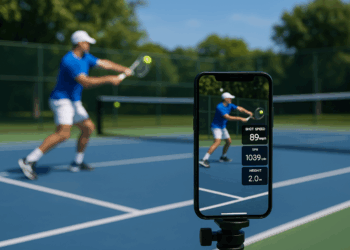Artificial intelligence (AI) has become a game-changer in many sectors – and sport is no exception. It can sift through massive amounts of data to help tailor fan engagement, as well as changing how sports stars train or play.
Understanding Artificial Intelligence
The simulation of human intelligence in machines designed to think, learn, and make decisions is what is known as artificial intelligence. Algorithms, data, and computing power are used by AI to identify patterns, predict outcomes, and automate tasks. Also, AI is increasingly being used to create personalized experiences through AI Companions—systems designed to interact with users in a more intuitive, human-like manner, offering support, conversation, and assistance in various contexts. From NSFW AI chat bot by EDEN AI to interactive virtual assistants like Siri, AI companions are transforming how humans engage with technology.
Some of the most common AI techniques include:
- Machine Learning (ML): Using algorithms to learn from data and improve predictions over time without explicit programming.
- Natural Language Processing (NLP): Enabling machines to understand and interpret human language, from speech to text analysis.
- Computer Vision: Allowing machines to interpret and analyze visual data like images and videos.
- Predictive Analytics: Forecasting outcomes based on historical and real-time data.
In sports, these technologies enable unprecedented precision and efficiency in decision-making. AI tools analyze player performance, optimize game strategies, and deepen fan engagement through personalized experiences. By merging innovation with sports tradition, AI fosters a new era where data-driven insights enhance both the competitive edge and entertainment value.
Transforming Coaching: Smarter Game Strategies
Coaching has traditionally relied on intuition and experience, but AI is now providing coaches with actionable insights that refine strategies. Tools powered by machine learning analyze vast amounts of data from games, practices, and opponent performances. These systems help coaches:

- Analyze Gameplay: Artificial intelligence analyses video footage to monitor player moves, passes and shots so as to establish areas in which a player may need to improve. During games, coaches can rely on some additional instruments including real-time analytics provided by computer vision.
- Develop Training Programs: AI identifies individual strengths and weaknesses, suggesting customized training regimens for players. For example, wearable devices track biomechanics, helping athletes correct form and avoid injuries.
- Predict Opponent Strategies: Predictive analytics tools process historical data to forecast opponent tactics, giving teams a tactical advantage.
One notable example is the use of AI-powered platforms like Hudl and Catapult, which analyze player data to optimize tactics and improve team cohesion. These innovations enable coaches to make more informed decisions under pressure, enhancing their ability to win games.
Enhancing Athletic Performance: The New Age of Training
Athletes today leverage AI tools to reach new levels of excellence. Whether it’s through wearables, virtual coaches, or AI-driven nutrition plans, these technologies are transforming how athletes train and recover.

- Wearable Technology: Devices like smartwatches and fitness trackers monitor heart rate, movement, and other key metrics in real time. These devices feed data into AI systems that offer personalized insights, such as when to push harder or rest.
- Virtual Coaching Assistants: AI companions provide 24/7 guidance, analyzing data from workouts and offering real-time feedback. For instance, AI apps use video footage to evaluate a sprinter’s form or a tennis player’s serve.
- Injury Prevention and Recovery: AI identifies patterns that signal potential injuries before they occur. Athletes use predictive analytics to avoid overtraining and optimize recovery time.
For instance, tennis players are under the surveillance of IBM’s Watson for real-time analysis of fatigue and injury hazards that occur during major tournaments. This helps in enhancing the performance of every sportsman through personalized training, reducing the associated liabilities.
Revolutionizing the Fan Experience
Artificial Intelligence (AI) goes beyond players and coaches to influence how fans interact with sports. By customizing content and enabling two-way communication, AI helps in enhancing the sense of involvement among supporters.
- Personalized Content: AI algorithms recommend highlights, stats, and articles tailored to each fan’s preferences. Apps like ESPN+ use machine learning to curate content based on viewing history.
- Interactive Platforms: Chatbots and virtual assistants answer fan queries, from game schedules to player stats. These tools provide instant access to information, enhancing convenience.
- Immersive Experiences: AI powers technologies like augmented reality (AR) and virtual reality (VR), offering fans an immersive way to experience games. Fans can use VR headsets to sit courtside or explore stadiums from their living rooms.
Live broadcasts are improved by artificial intelligence through real-time statistics and graphics which make games more interesting to viewers. Fox Sports, for instance, uses AI by broadcasters to create insights on major plays as well as individual athletes’ performances, enhancing the story aspect of sports.
Summary
Sports is experiencing a revolutionary change due to AI that is advantageous to all sports stakeholders. Sports have become data-based sectors whereby the use of AI tools enables coaches, athletes and even fans to make better judgment calls, have improved games as well as richer experiences. With its continuous development, artificial intelligence will revolutionize the field of sports by introducing something new in every part of the business. Whether on the field, in the stands, or behind the scenes, AI is redefining what’s possible in sports.








